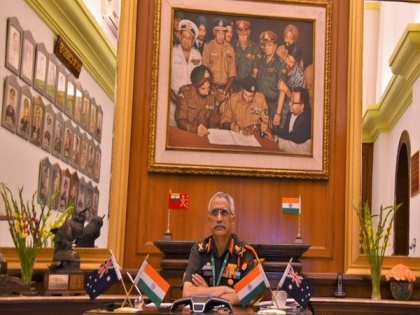Legacy issues, differences need to be resolved through dialogue, not unilateral actions: Gen Naravane
By ANI | Published: April 19, 2021 11:03 PM2021-04-19T23:03:49+5:302021-04-19T23:15:07+5:30
In an apparent reference to China amid border standoff in eastern Ladakh, Chief of Army Staff General MM Naravane on Monday said that "legacy issues and differences need to be resolved through mutual consent and dialogue and not by unilateral actions."

Legacy issues, differences need to be resolved through dialogue, not unilateral actions: Gen Naravane
In an apparent reference to China amid border standoff in eastern Ladakh, Chief of Army Staff General MM Naravane on Monday said that "legacy issues and differences need to be resolved through mutual consent and dialogue and not by unilateral actions."
Speaking on 'Geopolitics of Indo-Pacific Region' during the 'Chief of Army Symposium 2021' orgsed by the Australian Army, Gen Naravane also said there have been "positive developments" along the Line of Actual Control (LAC) with China.
He also referred to agreement in February with Pakistan on maintainance of ceasefire and said "India's relations with all its neighbours are on an upward trend".
Gen Naravane, who spoke through video-confernencing, said the changing character of war is throwing up new challenges for the armed forces the world over. "Our own region is witness that wars are no longer confined to the customary hard core kinetics but being increasingly contested in the ambiguous grey zone," he said.
The Army Chief said India has more than 15,000 kilometers of land borders alone. "We have strong relations with our neighbours based on shared culture, history and people to people linkages. We however have active and unsettled borders to our west with Pakistan and to the north and east with China, and of course, there are associated challenges," he said.
He said the country, over time, has developed various mechsms to address these challenges and move forward.
"As you would appreciate progress and development of any nation and the well-being of its citizenry are, to a large extent, contingent on peace and tranquillity on the borders. On our western borders, we have recently entered into a ceasefire understanding with Pakistan Army in February this year, and since then there has been no exchange of fire on an otherwise active Line of Control. This bodes well for the future," he said.
"With China too, there have been positive developments along the Line of Actual Control, an area where both countries have differing perceptions on the alignment of the land borders. This has led to disengagement of troops in Eastern Ladakh," he added.
The Army chief said the two countries have recently concluded the 11th round of Corps Commander level talks and "we hope to settle our other border through further negotiations".
"The recent comments of Ambassador Sun Weidong, the Chinese Ambassador to New Delhi to avoid relapse and jointly safeguard peace and tranquillity in border areas augers well for the future of India-China relations," General Naravane added.
He also talked about 'strong historical and cultural linkages' with Nepal and Bhutan, and said, "the large community of retired soldiers from Indian Army's Gurkha Battalions of Nepal Origin, form a strong connect with the people of Nepal. Similarly, with Bhutan, the Indian Army shares strong institutional linkages, which has stood the test of time."
He said India looks to maintain peace and harmony with all its neighbours and in the region.
Maintenance of peace and tranquility requires joint efforts. All nations need to come together to uphold Rules Based Order, respect International Laws & norms and develop mutual respect for each other. Legacy issues and differences need to be resolved through mutual consent and dialogue and not by unilateral actions," he said.
The Chiefs of Japan Ground Self Defence Forces, Australian Army, Indonesian Army and Singapore Army also took part in the symposium.
General Naravane said geo-strategic spaces are being constricted and geostrategic realities are being altered without physical battles.
"Conflicts are also steadily moving to the new domains of space, cyber and informatics," he said.
The Army chief said that the stretching of domains has made the physical boundaries mengless and leveraging technology has become a key determinant in future wars.
"Capability development is an ongoing process and the Indian Army is also on the path of modernization towards a 'Technology Oriented Army'. We are conscious that niche technologies including AI, autonomous and unmanned systems, long-range precision technology, Internet of Things, 5G and Quantum Computing, to name a few, need to be acquired to remain and capable to face future threats," he said.
"However, even as we move to a Technology Empowered Army, the peculiar unsettled nature of our borders means that the requirement of 'Boots on Ground' cannot be simply wished away," he added.
Speaking about India's Atmrbhar Bharat' initiative, the Army Chief said for a country like India, self-reliance has become a strategic imperative.
"We have launched the 'Atmrbhar Bharat' initiative to achieve self-reliance through Indigenization. But Indigenous production or Make in India does not mean that we close ourselves to others and produce everything. In today's world integrated by technology, this is simply not possible. In our quest for self-sufficiency, we look towards others for support and cooperation," he said.
General Naravane said that the nascent but rapidly growing defence sector in India offers new prospects and opportunities to its friends and partners to be part of its growth story.
"With a strong IT sector and a booming start-up culture, we look at joint ventures and technology cooperation with others. A large number of foreign compes are already moving base to India and setting up new plants. For the Indian Armed Forces, this means better options and customized solutions," he said.
( With inputs from ANI )
Disclaimer: This post has been auto-published from an agency feed without any modifications to the text and has not been reviewed by an editor
Open in app